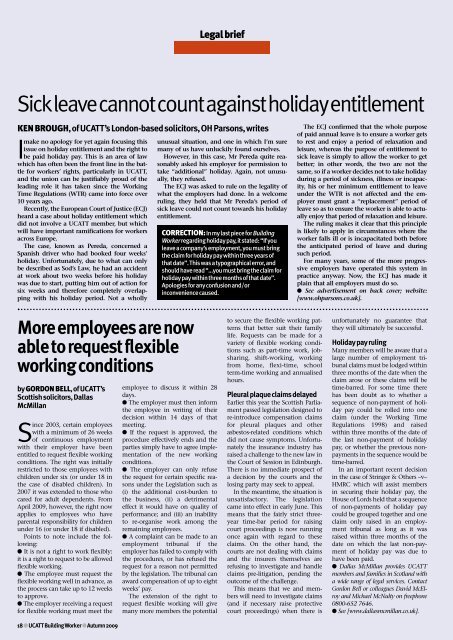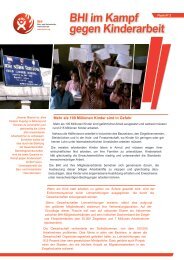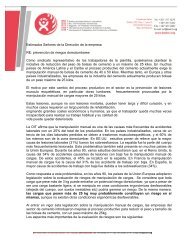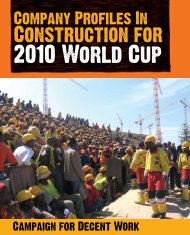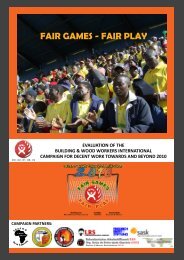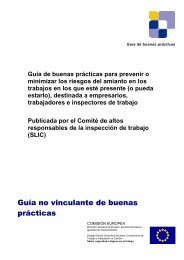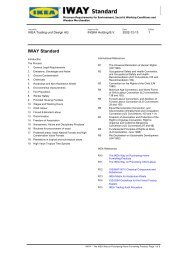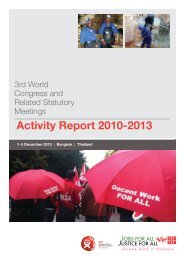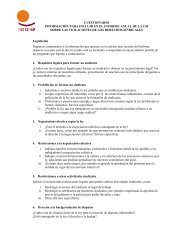Areyou oneof the3,200 onthe blacklist? - BWI
Areyou oneof the3,200 onthe blacklist? - BWI
Areyou oneof the3,200 onthe blacklist? - BWI
You also want an ePaper? Increase the reach of your titles
YUMPU automatically turns print PDFs into web optimized ePapers that Google loves.
Legalbrief<br />
Sickleavecannotcountagainstholidayentitlement<br />
KENBROUGH,ofUCATT’sLondon-basedsolicitors,OHParsons,writes<br />
Imake no apology for yet again focusing this<br />
issue on holiday entitlement and the right to<br />
be paid holiday pay. This is an area of law<br />
which has often been the front line in the battle<br />
for workers’ rights, particularly in UCATT,<br />
and the union can be justifiably proud of the<br />
leading role it has taken since the Working<br />
Time Regulations (WTR) came into force over<br />
10 years ago.<br />
Recently, the European Court of Justice (ECJ)<br />
heard a case about holiday entitlement which<br />
did not involve a UCATT member, but which<br />
will have important ramifications for workers<br />
across Europe.<br />
The case, known as Pereda, concerned a<br />
Spanish driver who had booked four weeks’<br />
holiday. Unfortunately, due to what can only<br />
be described as Sod’s Law, he had an accident<br />
at work about two weeks before his holiday<br />
was due to start, putting him out of action for<br />
six weeks and therefore completely overlapping<br />
with his holiday period. Not a wholly<br />
unusual situation, and one in which I’m sure<br />
many of us have unluckily found ourselves.<br />
However, in this case, Mr Pereda quite reasonably<br />
asked his employer for permission to<br />
take “additional” holiday. Again, not unusually,<br />
they refused.<br />
The ECJ was asked to rule on the legality of<br />
what the employers had done. In a welcome<br />
ruling, they held that Mr Pereda’s period of<br />
sick leave could not count towards his holiday<br />
entitlement.<br />
CORRECTION:InmylastpieceforBuilding<br />
Workerregardingholidaypay,itstated:“Ifyou<br />
leaveacompany’semployment,youmustbring<br />
theclaimforholidaypaywithinthreeyearsof<br />
thatdate”.Thiswasatypographicalerror,and<br />
shouldhaveread“…youmustbringtheclaimfor<br />
holidaypaywithinthreemonthsofthatdate”.<br />
Apologiesforanyconfusionand/or<br />
inconveniencecaused.<br />
The ECJ confirmed that the whole purpose<br />
of paid annual leave is to ensure a worker gets<br />
to rest and enjoy a period of relaxation and<br />
leisure, whereas the purpose of entitlement to<br />
sick leave is simply to allow the worker to get<br />
better; in other words, the two are not the<br />
same, so if a worker decides not to take holiday<br />
during a period of sickness, illness or incapacity,<br />
his or her minimum entitlement to leave<br />
under the WTR is not affected and the employer<br />
must grant a “replacement” period of<br />
leave so as to ensure the worker is able to actually<br />
enjoy that period of relaxation and leisure.<br />
The ruling makes it clear that this principle<br />
is likely to apply in circumstances where the<br />
worker falls ill or is incapacitated both before<br />
the anticipated period of leave and during<br />
such period.<br />
For many years, some of the more progressive<br />
employers have operated this system in<br />
practice anyway. Now, the ECJ has made it<br />
plain that all employers must do so.<br />
● See advertisement on back cover; website:<br />
[www.ohparsons.co.uk].<br />
Moreemployeesarenow<br />
abletorequestflexible<br />
workingconditions<br />
byGORDONBELL,ofUCATT’s<br />
Scottishsolicitors,Dallas<br />
McMillan<br />
Since <strong>200</strong>3, certain employees<br />
with a minimum of 26 weeks<br />
of continuous employment<br />
with their employer have been<br />
entitled to request flexible working<br />
conditions. The right was initially<br />
restricted to those employees with<br />
children under six (or under 18 in<br />
the case of disabled children). In<br />
<strong>200</strong>7 it was extended to those who<br />
cared for adult dependents. From<br />
April <strong>200</strong>9, however, the right now<br />
applies to employees who have<br />
parental responsibility for children<br />
under 16 (or under 18 if disabled).<br />
Points to note include the following:<br />
● It is not a right to work flexibly:<br />
it is a right to request to be allowed<br />
flexible working.<br />
● The employee must request the<br />
flexible working well in advance, as<br />
the process can take up to 12 weeks<br />
to approve.<br />
● The employer receiving a request<br />
for flexible working must meet the<br />
18●UCATTBuildingWorker●Autumn<strong>200</strong>9<br />
employee to discuss it within 28<br />
days.<br />
● The employer must then inform<br />
the employee in writing of their<br />
decision within 14 days of that<br />
meeting.<br />
● If the request is approved, the<br />
procedure effectively ends and the<br />
parties simply have to agree implementation<br />
of the new working<br />
conditions.<br />
● The employer can only refuse<br />
the request for certain specific reasons<br />
under the Legislation such as<br />
(i) the additional cost-burden to<br />
the business, (ii) a detrimental<br />
effect it would have on quality of<br />
performance; and (iii) an inability<br />
to re-organise work among the<br />
remaining employees.<br />
● A complaint can be made to an<br />
employment tribunal if the<br />
employer has failed to comply with<br />
the procedures, or has refused the<br />
request for a reason not permitted<br />
by the legislation. The tribunal can<br />
award compensation of up to eight<br />
weeks’ pay.<br />
The extension of the right to<br />
request flexible working will give<br />
many more members the potential<br />
to secure the flexible working patterns<br />
that better suit their family<br />
life. Requests can be made for a<br />
variety of flexible working conditions<br />
such as part-time work, jobsharing,<br />
shift-working, working<br />
from home, flexi-time, school<br />
term-time working and annualised<br />
hours.<br />
Pleuralplaqueclaimsdelayed<br />
Earlier this year the Scottish Parliament<br />
passed legislation designed to<br />
re-introduce compensation claims<br />
for pleural plaques and other<br />
asbestos-related conditions which<br />
did not cause symptoms. Unfortunately<br />
the insurance industry has<br />
raised a challenge to the new law in<br />
the Court of Session in Edinburgh.<br />
There is no immediate prospect of<br />
a decision by the courts and the<br />
losing party may seek to appeal.<br />
In the meantime, the situation is<br />
unsatisfactory. The legislation<br />
came into effect in early June. This<br />
means that the fairly strict threeyear<br />
time-bar period for raising<br />
court proceedings is now running<br />
once again with regard to these<br />
claims. On the other hand, the<br />
courts are not dealing with claims<br />
and the insurers themselves are<br />
refusing to investigate and handle<br />
claims pre-litigation, pending the<br />
outcome of the challenge.<br />
This means that we and members<br />
will need to investigate claims<br />
(and if necessary raise protective<br />
court proceedings) when there is<br />
unfortunately no guarantee that<br />
they will ultimately be successful.<br />
Holidaypayruling<br />
Many members will be aware that a<br />
large number of employment tribunal<br />
claims must be lodged within<br />
three months of the date when the<br />
claim arose or these claims will be<br />
time-barred. For some time there<br />
has been doubt as to whether a<br />
sequence of non-payment of holiday<br />
pay could be rolled into one<br />
claim (under the Working Time<br />
Regulations 1998) and raised<br />
within three months of the date of<br />
the last non-payment of holiday<br />
pay, or whether the previous nonpayments<br />
in the sequence would be<br />
time-barred.<br />
In an important recent decision<br />
in the case of Stringer & Others –v–<br />
HMRC which will assist members<br />
in securing their holiday pay, the<br />
House of Lords held that a sequence<br />
of non-payments of holiday pay<br />
could be grouped together and one<br />
claim only raised in an employment<br />
tribunal as long as it was<br />
raised within three months of the<br />
date on which the last non-payment<br />
of holiday pay was due to<br />
have been paid.<br />
● Dallas McMillan provides UCATT<br />
members and families in Scotland with<br />
a wide range of legal services. Contact<br />
Gordon Bell or colleagues David McElroy<br />
and Michael McNulty on freephone<br />
0800-652 7646.<br />
● See [www.dallasmcmillan.co.uk].


